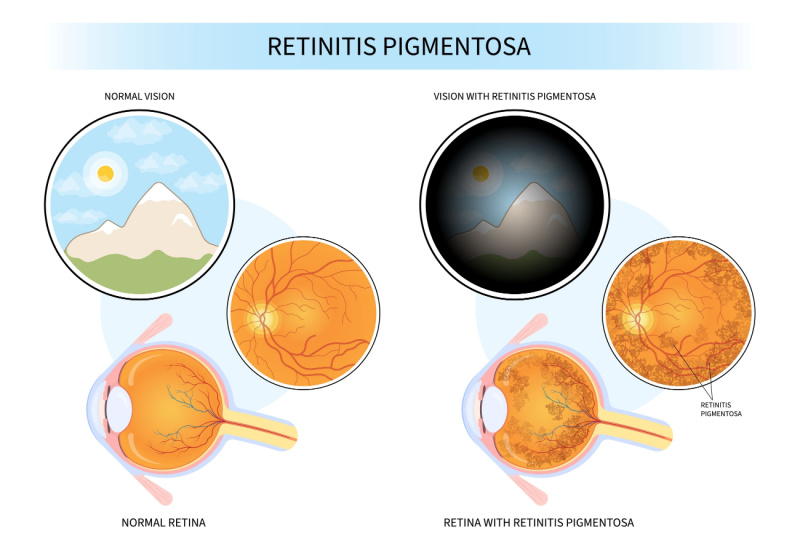Retinitis pigmentosa is a group of rare genetic eye diseases that can lead to total vision loss. Photoreceptors that are fully functioning allow the retina to convert light into signals which your brain interprets as vision. However, as the photoreceptor function declines, gradual vision loss can occur.

Symptoms
Retinal photoreceptors are composed of rods and cones. Rods are located on the outer portion of the retina and are active in low light. Cones are in the center of the retina and allow you to see color and fine details.
In most cases, retinitis pigmentosa will affect the rods first. Meaning, peripheral vision will begin to deteriorate, and the ability to see in low light (at night or in the dark) will weaken. These symptoms typically begin in childhood. As the disease progresses, central vision will deteriorate too. As a result, the ability to see fine details (like words in a book and faces) will progressively weaken. Additionally, there could be problems with color vision resulting in the inability to see different colors.
Both the age of onset and the rate of progression in symptoms vary from patient to patient.
Diagnosis and Treatments
Retinitis pigmentosa is a genetic disease passed from parent to child. Thus, an ophthalmologist will ask for a family medical history. They will perform a visual field test to assess central and peripheral vision, along with other various tests, including an ERG (to see how the retina responds to light) or an OCT (to take highly detailed pictures of the retina). In some cases, an ophthalmologist might recommend genetic testing to learn more about the patient’s specific type of retinitis pigmentosa.
At this time, there is no cure or single treatment for retinitis pigmentosa because there are over 100 genes that cause it. However, there are accommodative resources for those affected by the disease. There are also assistive devices and vision aids that can help with the symptoms associated with retinitis pigmentosa. Our board-certified retina surgeons, Dr. Burgess, Dr. Lara, and Dr. Villate, are extensively experienced in dealing with retinal diseases like retinitis pigmentosa. Contact our office today at 954-741-5555 to schedule a consultation.






